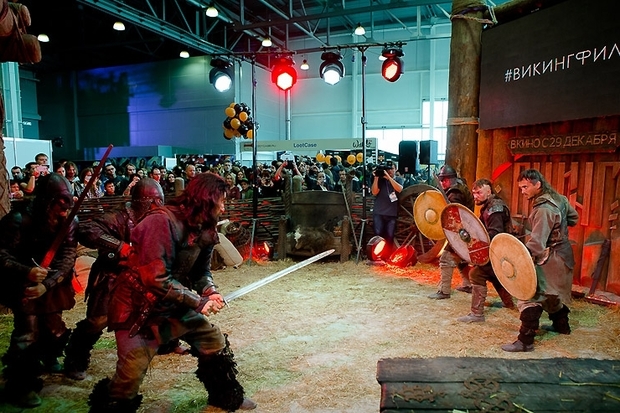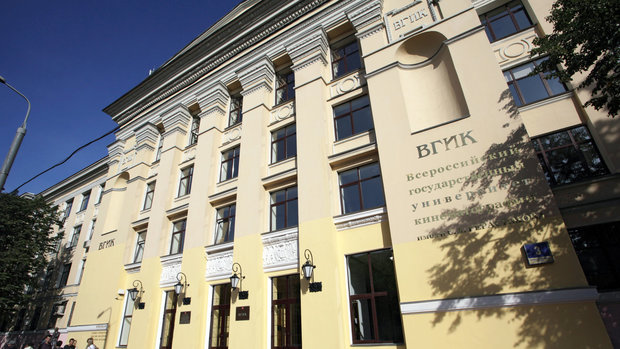''State support kills Russian cinema with unclear donations''
Film producer from Kazan about how to shoot films when it is almost possible to do it
Director of Integration film company Aleksandr Khachko presented his debut 30-minute The Utopians as a producer at the Kazan film festival. In an interview to Realnoe Vremya, the director who was born in Kazan and has been living and working in Moscow for the last 14 years told about his forced orientation to the international market, unreturned money as the main principle of Russian cinema and final sensational release.
It won't be possible make a new Terminator
In our preliminary talk, you said quite an unexpected thing that your company won't try to remain in the Russian film market but try to directly go to the international one. Why?
Because at one point we understood that the Russian film industry came to a dead end.
But probably nobody waits for you there.
It is not an easy road, of course. This is why we move towards the goal very gradually, we accumulate the basis. It is clear we can't just up and make a new Terminator. In this respect, we can't catch up with the world cinematography any more. But we can be interesting for the world with our unique culture and our huge geography of shooting. In general, it is the only thing that the Russian cinematography can offer the world. It is what we know and do better than others.
But probably there have already been attempts to show the world our culture. Are your attempts different?
Yes, our approach is a bit different. In general, Russia tries to sell already shot films abroad. In other words, they shoot a film first and then think: ''What if we send it somewhere else? Maybe to China?'' And our idea is to create films for the international market, for the international audience – in English, by English-speaking scenarios written on our order. For instance, Luc Besson who shoots French cinema for spectators around the planet has been doing it for a long time. For example, now we are working with an American scriptwriter who writes the script for a romcom that takes place mainly in Russia – in Moscow and Saint Petersburg.
And understanding that the road is not easy, that we won't start shooting a big project soon, we decided to make a test by shooting a film in Russia. It will consist of three novels united by a common story. Only 1/3 has been shot now that is made as an independent short-length film. There is a trailer, it was published in open sources. The film is called The Utopians. We took it to Cannes, participated in Short Film Corner. This programme has selection (about 3,000 films were selected last year) but no contest. It is just a kind of opportunity for people who want to bring their film to a big film forum present themselves on it and find some contacts.
Bondarchuk makes bad films. But he at least tries
Is this departure from the Russian market a tendency for such companies as yours?
In general, producers have such a turn in their heads. When just making a film, they start to think how they will sell it in the international market. The situation pushes to it – the Russian market is very limited. Filmmakers get not more than half of the box-office success, the rest goes to cinemas and providers. And the advertising budget that is also not big, as a rule, needs to be deducted from it. In some cases, it excels the production budget. This is why everybody stopped making money from distribution a long time ago. It is considered by producers as a bonus: ''Oh, they also made money from distribution, cool''.
How they earn?
They earn while making a film. In other words, they shoot with the money that they don't need to return. It is the principle of all Russian cinema thanks to which it exists. The majority of big films is sponsored by the country or, more precisely, by the Ministry of Culture through the Film Fund. And the funniest thing is that this money is expended for commercial projects. But as far as I am concerned, the Ministry of Culture of Russia has another task – to develop Russian culture. What is the sense in supporting commercial projects? They must earn themselves, that's to say, take out loans, shoot films, return loans and live on the rest of the money like in usual business.
''Fyodor Bondarchuk also votes for his projects. But Bondarchuk is still a good example because he really tries to shoot films. He does it bad, very bad at times. But there are many people around him who really try. That's to say, a job is done there.'' Photo: kinorinok.proficinema.ru
But it doesn't happen so. In addition, a big number of films whose production is backed by our country has no cultural value. There are records of transmissions of the Film Fund's pitches on the Internet where presentation and selection of projects take place. Anyone can watch them, and it is a very funny performance. The Ministry of Culture introduced a principle about 10 years ago that not anybody but major companies (they seem to be eight) can present films in the contest to get state support. Consequently, if you are a young director or producer, want to shoot films and it seems to you to be prospective, you need to turn to one of such companies.
For instance, producer Elena Borisova. She has several companies, she chairs in the Film Fund herself, votes for competitors and gets money directly or through plants. Fyodor Bondarchuk also votes for his projects. But Bondarchuk is still a good example because he really tries to shoot films. He does it bad, very bad at times. But there are many people around him who really try. That's to say, a job is done there.
VGIK as symbol of low quality
There was quite a lively discussion about whether quotas for demonstrating foreign films in Russia needed to be introduced several years ago. What do you think about it?
Now this discussion has been very topical because of the amendments to the Law on Cinematography that the same Ministry of Culture offered. But today the distribution certificate (a document that permits distribution) is 3,500 rubles, and it will be 5m rubles. The idea of the Ministry of Culture to get rid of low-quality foreign films.
What will it lead to? Speaking about foreign cinema, non-blockbusters will go. It is clear that 5 million rubles for some Terminator 9 is nothing. They will pay, of course. But such a film seems to correspond to the concept of 'quality film' because the current minister of culture of Russia understands quality film as a film that earns money. It is a fair question because spectators' interest is also an indicator, in general. But one can win spectators' interest not only by a film's quality but also a beautiful package and smart marketing. There are films like Viking that have no value in itself but were very cool in distribution because they were advertised from everywhere. In general, with its novelty, the Ministry of Culture will also get rid of good films that have small commercial potential like The King's Speech. And the so-called limited distribution where amateur films are shown will close.

''One can win spectators' interest not only by a film's quality but also a beautiful package and smart marketing. There are films like Viking that have no value in itself but were very cool in distribution because they were advertised from everywhere.'' Photo: tele.ru
As for Russian cinema, I think now our state support kills it with these unclear donations, and the 5-million payment for the distribution certificate will finally kill it. In other words, on the one hand, the country will donate obscene comedies and films of affiliated people and structures. On the other hand, it will just close the road to the screen to almost other films.
This year Russian cinema doesn't beat a box-office record, and its share in distribution reached 25%. It fell to 15% several years ago.
The question is how natural this growth is because the Ministry of Culture forces cinemas: ''Take our films, we will give quotas''. And the cinemas answer: ''Yes, with pleasure. But give us good Russian films, we even won't need any quotas''. And they distribute these films while halls are empty.
Actually, besides quotas, one needs to simultaneously deal with several processes, do many things. It is clear that commercial cinemas find it more profitable and easier to work with blockbusters. They even don't need advertising, you just put the title, and you will certainly have a box-office success. Producers also invest in advertising because they are projects at thousands of millions of dollars. It is by far more complicated to provide a box-office success of non-promoted films that don't have any very famous actor. Only film fans will go to watch them, and this audience needs to be brought up and educated.
Russian cinema needs to be promoted somehow. Now an ordinary spectator has a stereotype that our cinema is bad by default. People continue watching Russian series on TV but don't want to go to the cinema to watch our film even if they are shown a good trailer. Only a mass information attack like in case of Attraction or Viking can attract spectators. That's to say, a certain educational job needs to be done – to explain that we also shoot good films, find them among films that were made and help them reach spectators. Such films exist.

''The majority of these film schools doesn't teach to make a film but faff around. And VGIK (the Gerasimov Institute of Cinematography) already became a symbol of low quality.'' Photo: films.change.org
On the other hand, we need to develop the cinematographic education, so that somebody will shoot these good films. Education in Russia is also in a crisis. Our film schools that make money from people's desire to be close to cinema develop. Actually, the majority of these film schools doesn't teach to make a film but faff around. And VGIK (the Gerasimov Institute of Cinematography) already became a symbol of low-quality films. Cinematographers say to each other (sarcastically): ''Come on, make VGIK''.